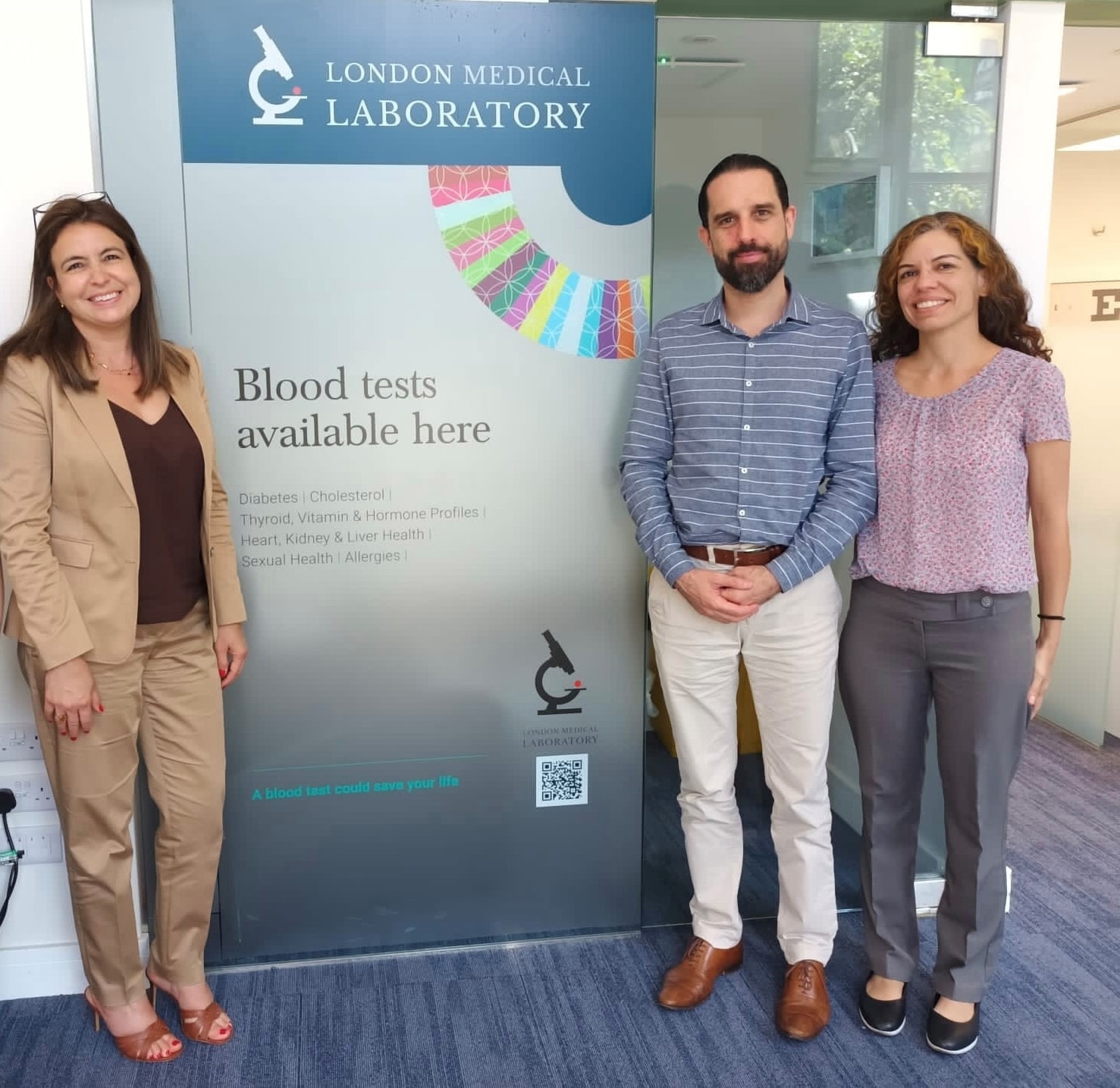Brazil’s NHS equivalent, the SUS, is the largest Government-run public healthcare system in the world. It’s free at the point of access but faces strong demand and increasing wait times. London Medical Laboratory is now in talks about sharing some of the knowledge behind its revolutionary blood testing technology, to help the SUS identify health issues early and dramatically reduce future demand.
 Flavia Araujo‑Rankin (left), the founder and Co‑CEO of London Medical Laboratory, meets with two representatives from Brazil’s Institute for Applied Economic Research (IPEA): Pedro Miranda, IPEA’s Deputy Director of Sectoral Policies and Studies, Innovation and Infrastructure and Priscila Koeller, researcher at IPEA´s Centre for Research on Science, Technology and Society. Image Credit: London Medical Laboratory
Flavia Araujo‑Rankin (left), the founder and Co‑CEO of London Medical Laboratory, meets with two representatives from Brazil’s Institute for Applied Economic Research (IPEA): Pedro Miranda, IPEA’s Deputy Director of Sectoral Policies and Studies, Innovation and Infrastructure and Priscila Koeller, researcher at IPEA´s Centre for Research on Science, Technology and Society. Image Credit: London Medical Laboratory
London Medical Laboratory, the UK’s first omnichannel blood testing, diagnostic and health check business, is in talks with the world’s largest Government-run public healthcare system, to help slash Brazil’s patient waiting lists.
Brazil’s NHS equivalent, the Unified Health System (in Portuguese the Sistema Único de Saúde or SUS) offers free care at the point of delivery. The SUS offers generally high-quality services but has growing concerns around patient access due to high demand and long wait times.
London Medical Laboratory (LML) is now discussing sharing some of the knowledge behind its revolutionary blood testing technology, to help the SUS transform into a preventative healthcare system. Using methods originally developed by LML and its partners, the SUS would be able to identify problems before patients even show symptoms. This could dramatically reduce future demand by diagnosing early some of Brazil’s most common health issues.
The founder and Co‑CEO of London Medical Laboratory, Flavia Araujo‑Rankin, was born in Brazil and is very familiar with the country’s healthcare system. She met with two representatives from Brazil’s Institute for Applied Economic Research (IPEA): Pedro Miranda, IPEA’s Deputy Director of Sectoral Policies and Studies, Innovation and Infrastructure and Priscila Koeller, who is a researcher at IPEA´s Centre for Research on Science, Technology and Society. The IPEA is responsible for investigating public policies and one of its projects is now focused on technological development and technology transfer in the health sector and for Brazil’s health care system.
Says Flavia: ‘This is a wonderful opportunity for LML to share its knowledge to help reduce the burdens on Brazil’s amazing but incredibly hard-pressed health service. There are currently around 618,593 doctors registered in Brazil; that’s an increase of around 70% over 2010. However, the total population is around 217 million and everyone is entitled to use SUS services (although 23% of Brazilians have private healthcare plans). That show the scale of the potential demand on Brazil’s public healthcare.
‘Another challenge is that Brazil has some 50,000 clinics but, largely, these cover more urban areas, whereas its landmass is some 3.3 million square miles.
‘With that in mind, LML’s blood testing technology could transform Brazil’s health care by preventing many cases of the most common conditions before they ever develop. For example, we were able to introduce LML’s tests for diabetes and high cholesterol to IPEA representatives. It’s thought at least 8 million Brazilians are suffering from undiagnosed diabetes. The disease leads to almost 55,000 leg or foot amputations every year. By identifying it at an early stage, through simple, fingerprick blood tests, the SUS could save both lives and money.
‘Similarly, more than 4 in 10 Brazilians are likely to have high cholesterol, which puts them at significant health risk. It can lead to heart attacks, strokes, dementia and other cardiovascular problems. Early diagnosis will dramatically impact outcomes and help decrease the strain on local services.
‘Here is how the blood testing system could work, helping to transform local healthcare:
- A patient attends their local health center, such as a UPA (Unidade de Pronto Atendimento) clinic, to pick up a fingerprick blood testing kit.
- They take the test at home and drop the sample back at the clinic.
- The sample is delivered to a local SUS public laboratory, where it is processed.
- Using integrated technology, the results are assessed by healthcare professionals, with the potential assistance of AI.
- The results are sent to the patient and they and their clinic will be alerted if a health problem is identified.
- The patient can then be reviewed at their local clinic if needed, the diagnosis confirmed and any necessary treatment started.
‘In Britain, LML’s blood testing services are only directly accessible privately. Brazil could point the way forward, by being the first country to embrace a national policy of blood testing to pre-empt many conditions before they ever develop.
‘Prevention is always better than cure, no matter where in the world you are. We are very excited to see how LML’s knowledge and experience can be shared with Brazil’s IPEA representatives and its wider healthcare system to help further improve the success of its ambitious public healthcare services.
‘Here in the UK, London Medical Laboratory’s wide range of fingerprick tests can be taken at home through the post, or at one of the many drop-in clinics that offer these tests across London and nationwide in over 95 selected pharmacies and health stores.